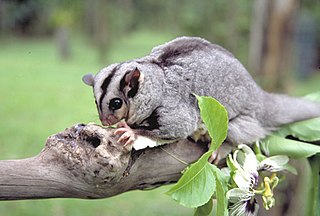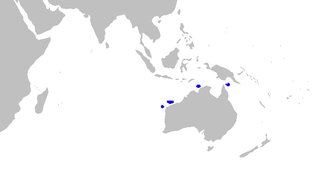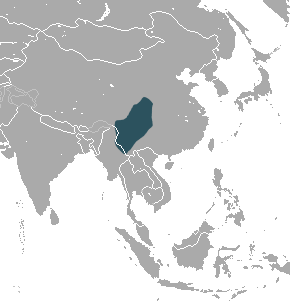
The cuckoo-roller or courol is the only bird in the family Leptosomidae, which was previously often placed in the order Coraciiformes but is now placed in its own order Leptosomiformes. The cuckoo-roller is at the root of a group that contains the Trogoniformes, Bucerotiformes, Piciformes, and Coraciiformes. Despite its name, the Cuckoo-roller does not share close evolutionary origins with cuckoos or rollers at all.

The genus Spilogale includes all skunks commonly known as spotted skunks. Currently, there are four accepted extant species: S. gracilis, S. putorius, S. pygmaea, and S. angustifrons. New research, however, proposes that there may be up to seven.

The graceful prinia is a small warbler. This prinia is a resident breeder in northeastern Africa and southern Asia, from Egypt and Somalia east to Saudi Arabia, where it is sometimes called streaked wren-warbler.

Nepenthes gracilis, or the slender pitcher-plant, is a common lowland pitcher plant that is widespread in the Sunda region. It has been recorded from Borneo, Cambodia, Peninsular Malaysia, Singapore, Sulawesi, Sumatra, and Thailand. The species has a wide altitudinal distribution of 0 to 1100 m above sea level, although most populations are found below 100 m and plants are rare above 1000 m. Despite being a widespread plant, natural hybrids between N. gracilis and other species are quite rare.

The mahogany glider is an endangered gliding possum native to a small region of coastal Queensland in Australia.

The slender sawtail catshark is a little-known species of catshark, part of the family Scyliorhinidae, endemic to northern Australia. It is found over the continental slope in 290–470 m (950–1,540 ft) on water. Growing to 34 cm (13 in) long, this shark has a slim gray body with four dark saddle markings below the dorsal fins and on the caudal fin, as well as a prominent crest of enlarged dermal denticles along the dorsal edge of the caudal fin. The slender sawtail catshark is not valued by fisheries but is taken as bycatch. The International Union for Conservation of Nature (IUCN) presently lacks enough information to assess its conservation status.

The western spotted skunk is a spotted skunk of western North America.
The slender harvest mouse is a species of rodent in the family Cricetidae. It is small and mouse-like and is distributed throughout a portion of Central America.

The gracile shrew tenrec is a species of mammal in the family Tenrecidae. It is endemic to Madagascar. Its natural habitat is subtropical or tropical moist montane forests.

The Talamancan small-eared shrew is a species of mammal in the family Soricidae. It is found in Costa Rica and Panama.

The gracile shrew mole is a species of mammal in the family Talpidae. It is endemic to China; populations known from Myanmar likely represent other species.

Wendlandiella is a genus of one species of palms found in Peru, Bolivia and Acre state in Brazil. The genus is named after Hermann Wendland.
Citrus gracilis, the Humpty Doo lime or Kakadu lime, is a straggly shrub endemic to eucalypt savannah woodlands of Northern Territory, Australia.

Trimeresurus gracilis, commonly known as the Taiwan pit viper or Taiwan mountain pitviper, is a venomous pit viper species endemic to Taiwan. No subspecies are currently recognized. The species is known as kikushi habu in Japanese.

Ophiclinus gracilis, the Black-back snake-blenny, is a species of clinid native to the coastal waters of southern Australia where it prefers areas with rotting vegetation on silty substrates. It can reach a maximum length of 10 centimetres (3.9 in) TL.
The slender tube-nosed bat is a species of vesper bat in the family Vespertilionidae found only in Taiwan.
The Field Elm cultivar Ulmus minor 'Viminalis Gracilis' [:'slender'] is a form of U. minor 'Viminalis'. Cultivars listed as Ulmus gracilisHort. by Kirchner (1864), and as U. scabra viminalis gracilisHort. by Dieck (1885), were considered by Green to be forms of Melville's U. × viminalis. A 1929 herbarium specimen held at the Hortus Botanicus Leiden is labelled U. campestris var. viminalis f. gracilis, implying a cultivar that differed from the 'type' tree.
Nitrospinota is a bacterial phylum. Despite only few described species, members of this phylum are major nitrite-oxidizing bacteria in surface waters in oceans. By oxidation of nitrite to nitrate they are important in the process of nitrification in marine environments.
Beroe gracilis is a species of comb jelly in the family Beroidae. It is a free-swimming species found in the North Sea, the Atlantic Ocean and the Mediterranean Sea.

Tucayaca is a genus of spur-throat toothpick grasshoppers in the family Acrididae. There are about five described species in Tucayaca, found mainly in South America.















